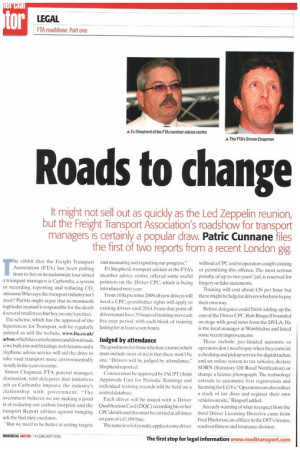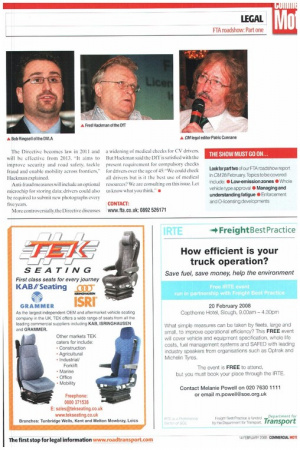Roads to change
Page 26

Page 27

If you've noticed an error in this article please click here to report it so we can fix it.
It might not sell out as quickly as the Led Zeppelin reunion, but the Freight Transport Association's roadshow for transport managers is certainly a popular draw. Patric Cunnane files the first of two reports from a recent London gig.
irhe rabbit that the Freight Transport Association (FTA ) has been pulling from its hat on its nationwide tour aimed it transport managers is Carbonfta, a system or recording, reporting and reducing CO, :missions.Who says the transport industry isn't ;reen? Purists might argue that its mammoth ingbincler manual is responsible for the death if several small trees but hey, no one's perfect. The scheme, which has the approval of the )epartment for Transport, will be regularly .pdated. as will the website, www.fta.ro.uk/ arbon,which has extra features and downloads. 1ews bulletins and briefings, web forums and a alephone advice service will aid the drive to lake road transport more environmentally -iendly in the years to come.
Simon Chapman. VIA general manager. iformation, told delegates that initiatives ach as Carbonfta improve the industry's clationship with government: "The overnment believes we are making a good St of reducing our carbon footprint and the ransport Report advises against bringing ack the fuel duty escalator.
"But we need to be better at setting targets and measuring and reporting our progress."
Es Shepherd. transport advisor at the FTA's member advice centre, offered some useful pointers on the Driver CPC, which is being introduced next year.
From 10 September 2009 all new drivers will need a CPC; grandfather rights will apply to existing drivers until 2014, From that point all drivers must have 35 hours of training over each five-year period, with each block of training lasting for at least seven hours.
Judged by attendance The good news for those who hate exams (which must include most of us) is that there won't be one. "Drivers will be judged by attendance," Shepherd reported.
Courses must be approved by JAUPT (Joint Approvals Unit for Periodic Training) and individual training records will be held on a central database.
Each driver will be issued with a Driver Qualification Card (DQC) recording his or her CPC details and this must be carried at all times on pain of a £1,000 fine.
The same level of penalty applies to any driver without a CPC and to operators caught causing or permitting this offence. The most serious penalty, of up to two years' jail, is reserved for forgery or false statements.
Training will cost about £36 per hour but there might be help for drivers who have to pay their own way.
Before delegates could finish adding up the cost of the Driver CPC, Rob Ringsell bounded on stage with good news from the DV LA. He is the local manager at Wimbledon and listed some recent improvements.
These include: pre-funded accounts so operators don't need to pay when they come in; a checking and pickup service for digital tachos; and an online system to tax vehicles, declare SORN (Statutory Off Road Notification) or change a licence photograph. The technology extends to automatic first registration and licensing for LO Vs.-Operators can also collect a stack of tax discs and register their own vehicles on site,Ringsell added.
An early warning of what to expect from the third Driver Licensing Directive came from Fred Hackman. an offficer in the Dfrs licence, roadworthiness and insurance division.
The Directive becomes law in 2011 and will be effective from 2013. "It aims to improve security and road safety, tackle fraud and enable mobility across frontiers," Hackman explained.
Anti-fraud measures will include an optional microchip for storing data; drivers could also be required to submit new photographs every five years.
More controversiallythe Directive discusses a widening of medical checks for CV drivers. But Hackman said the DIT is satisfied with the present requirement for compulsory checks for drivers over the age of 45: We could check all drivers but is it the best use of medical resources? We are consulting on this issue. Let us know what you think." •
CONTACT: www.fla.co.uk; 0892 526171
































































































































































